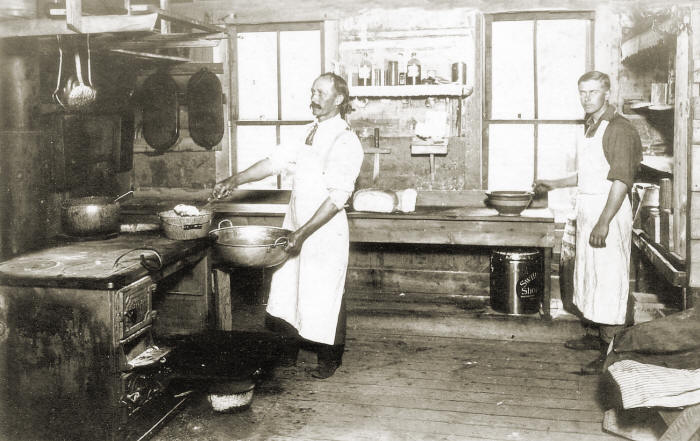Logging Past and Present:
Bill Warns Recalls Early Logging Days
Contributed by Maxine Schulze and transcribed by Lani Bartelt.
Editors Note: The day of the logging camp and the lumberjack has long passed from view leaving a vast heritage of traditions, history, myths, and memories.
Most of the early settlers of the area spent working time in the woods, either on their own land or in the logging camps and mills of the large lumber companies.
Last week and now and now again this week the Owen Enterprise features the memories of this by-gone day as remembered by Bill Warns, who worked in a logging camp as a boy of thirteen. Typical of many other settlers of the area, his family moved in to settle and forge farms as the “cut- over” lands sold by the lumber companies. Bill Warns’ story is the story of the early history of the area and the northern part of the State of Wisconsin.
|
|
Lumber Camp Cook, Charles Funk, is pictured on the left.
After the land along the river valleys had been logged the lumber company that had bought the land for the timber now sought to sell and settle the land for farms. Most of the vast forest lands had been bought by lumber companies like the Squaw Creek Lumber Company, the John Owen Company, or (missing)ster Company and with (missing) white pine logg (missing) off, the land was of no further use to them. Each company put out feelers ,handbills ,posters, and newspaper notices to attract families to buy and settle on the cut-over lands. Some companies such as the Forest Company went so far as to burn off the brush and scrub and then plant timothy and clover to attract settlers.
The Squaw Creek Lumber Company attracted the Warns family who were then living in Milwaukee. Fred Warns bought 160 acres from the Squaw Creek Lumber Company on the Black River land still covered with timber although the white pine had been logged off. When the Warns arrived in 1903 the only place they could land was in the village of Withee, they had to travel north to Maplehurst by sleigh and then by the ice on the Black River to the log cabin on their 160 acres. Once they got into the woods Bill Warns said it was almost impossible to get out again. The lumber company had a company store nearby and being so far from other communities, the family had to do their buying from the company store and it was the lumber company that they earned their little of nothing of cash income to survive their first years.
In the early years after their arrival the Warns earned some income from cutting and hauling logs from their land to one of the Squaw Creek company saw mills in the village of Maplehurst. All they earned for their hard work hauling the logs three miles to the mill was $3.00 a thousand foot and usually the money was just applied to their mortgage or on what they owed the company on account for food or other necessities.
Many other settlers who bought land for farms spent the winter months in the woods and in the camps to earn money to pay their bills and provide for their families. Fathers, and their sons, when old enough, at least twelve, went into the woods to work at the only job available for earning any cash income and the tradition was continued for many years after the camps and the mills had long disappeared. Many “old-timers” in the area worked various jobs in the camps, some as lumberjacks, teamsters or blacksmiths, others as cooks.
With the arrival of the railroads logs were no longer sent to the mills by river. Up north near the Warns farm the Soo Line in 1905 had cut a right of way from Owen to Ladysmith. The settlers in the area petitioned the Soo Line to put in a spur track to a sawmill built in 1912 by Ed Smith. The little community was then known as Amber now became known to the Soo Line as “Spur S315.” The sput (spur) was finished in 1912. Ed Smith now enlarged his mill, built bunk houses, a cook shack, and barns for the rail crews.
In the winter the mill was shut down and the men went into the woods to cut the timber for the mills to saw in the spring and summer. Bill Warns and his brothers, Fred and Joe and his Dad worked in the mill and the woods. Following the two years in the logging camp owned by Charlie Very Bill worked one winter for Tony Suppeta as a teamster. One summer he worked in the mill as a teamster with a big “jamer” loader, which moved on the spur track to load the logs on the railroad cars.
The jamer was a tripod with a boom and a cable with pulleys. At one end of the cable a team of horses were hitched with Bill at the reins to lift the logs. His brother, Jack was the “top loader” using a cant hook to maneuver and Bill’s dad and brother Fred were on the ground to hook the logs with the chair and cable. The boom was then swung around above the flat cars and the team backed lower and place the lo(missing) the car.
|
© Every submission is protected by the Digital Millennium Copyright Act of 1998.
Show your appreciation of this freely provided information by not copying it to any other site without our permission.
Become a Clark County History Buff
|
A site created and
maintained by the Clark County History Buffs
Webmasters: Leon Konieczny, Tanya Paschke, Janet & Stan Schwarze, James W. Sternitzky,
|

